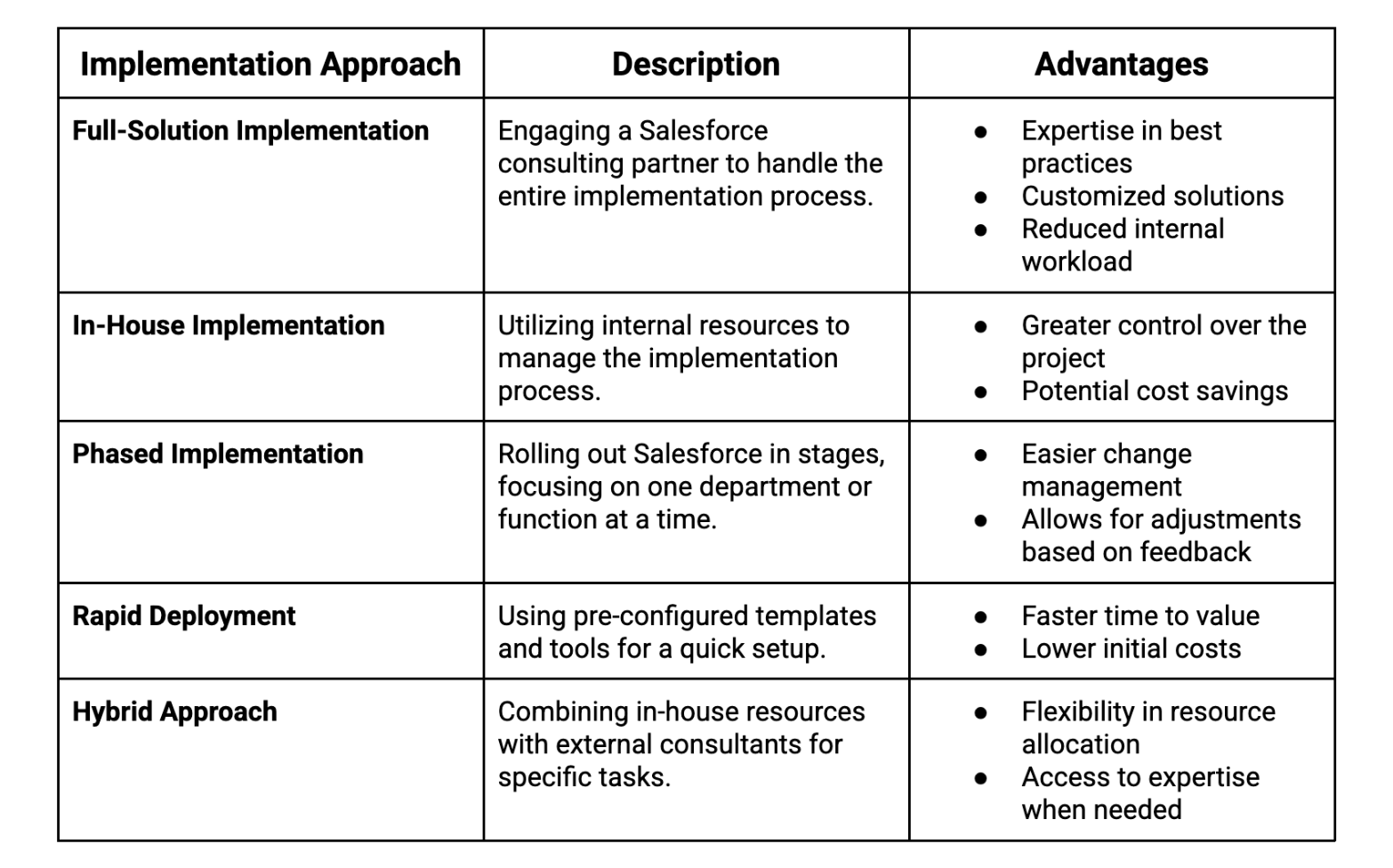Introduction
- Understanding the Financial Implications of Salesforce Implementation
- A Comprehensive Guide to Salesforce Implementation Costs
- Evaluating the Costs Involved in Implementing Salesforce Solutions
Salesforce is a powerful CRM platform that enhances client interactions, streamlines sales, and boosts operational efficiency. However, the typical costs for salesforce implementation associated with implementing Salesforce can vary significantly based on several factors, including business size, customization needs, and the specific Salesforce products chosen. Here’s a breakdown of Salesforce costs, including setup, customization, and maintenance.
Factors Influencing Salesforce Implementation Costs
Businesses aiming to budget wisely and ensure a successful deployment must understand the various factors influencing typical costs for Salesforce implementation services. Organizations can make well-informed selections that fit their unique requirements and budgetary limits by weighing these variables.
Project Complexity and Scope
Costs can be greatly impacted by the complexity and extent of a Salesforce setup. For simpler implementations, Sedin offers a Quick Start Implementation package that leverages standard configurations. This approach saves both time and resources, making it a cost-effective solution for businesses looking to streamline their Salesforce setup efficiently.
Consulting Fees
A significant amount of installation expenses is frequently incurred by hiring Salesforce consultants or agencies. These experts offer knowledge that can expedite the procedure and prevent expensive errors. Depending on the complexity of the project, consulting costs might vary greatly; for example, simpler initiatives may cost less than more complicated implementations requiring specific expertise and abilities.
Data Migration Costs
A crucial component of implementing Salesforce is data migration, which involves transferring existing data from current or legacy systems into Salesforce. Since these expenses can greatly increase the overall implementation budget, organizations should prepare for the usual typical costs for salesforce implementation of data preparation and transfer.
Training and Support
To guarantee that staff members can use Salesforce efficiently after implementation, user training is crucial. The number of users and the level of training needed can affect training and typical costs for salesforce implementation. Costs for continuing support should also be taken into account, since companies can want continuous help to handle any problems or updates that come up after the first rollout.
Breakdown of Typical Costs
Understanding the different cost components involved is crucial when thinking about implementing Salesforce. A thorough explanation of the usual costs of using Salesforce, including initial setup, customisation, and continuing maintenance, is provided below.
Initial Implementation Costs
Salesforce's first setup fees range from $5,000 to $150,000. The size of your company, the intricacy of your business procedures, and the particular Salesforce products you decide to implement are some of the variables that affect this variance.
Customization Costs
To satisfy their particular requirements, many businesses choose customized solutions, which raises the cost of Custom Salesforce Development Services. These costs may vary from $10,000 to $250,000, contingent on the level of personalization needed. The degree of interaction with current systems, the creation of unique applications, and particular feature upgrades are some of the variables affecting these expenses.
Ongoing Maintenance and Support
After Salesforce is put into operation, continuing support and maintenance are essential to guaranteeing peak performance and user happiness. Support expenses usually fall between $1,000 and $20,000 per month. This range represents differences in service levels, such as basic assistance vs full-service managed services that could involve frequent system updates and training.
Comparison of Different Implementation Approaches
Organizations have a variety of options when it comes to integrating Salesforce, each with unique benefits and drawbacks. The success of the project as a whole, including budgets, schedules, and user adoption, can be greatly impacted by the implementation method chosen. The most popular implementation strategies are contrasted below to assist companies in making well-informed choices depending on their unique requirements and available resources.

Organizations may efficiently evaluate their alternatives and select a strategy that fits their objectives and capabilities thanks to this table's concise summary of each technique.
Range of Costs for Salesforce
Salesforce implementation costs vary based on business size and project complexity. For small businesses, expenses typically range from $10,000 to $50,000, covering basic setups with minimal customization. Medium-sized enterprises should budget between $50,000 and $180,000 for more comprehensive implementations involving advanced features and integrations. Larger businesses with more complicated needs may incur costs that exceed $200,000. salesforce data migration services initiatives, consulting fees, integration with current systems, and continuing support requirements are important factors that affect these expenses.
The cost of implementing certain products, such as Sales Cloud, typically includes licensing fees, which can start at $25 per user per month. However, for more advanced features, the licensing costs may rise to $300+ per user per month. These figures do not include additional implementation or developer fees. Furthermore, a number of variables, like project scope and customisation needs, are crucial in establishing the ultimate salesforce implementation cost and deployment.
Cost Optimization Strategies
For businesses, implementing Salesforce can be a major investment, therefore it's critical to investigate cost optimization techniques that might assist optimize value while lowering salesforce implementation pricing. Through careful planning and execution of the implementation process, companies can accomplish their CRM goals without going over budget.
1. Define Clear Objectives
Clear business objectives and requirements must be established before implementation begins. Organizations can steer clear of superfluous features and customizations that could drive up costs by establishing clear objectives, such as increasing customer support or sales efficiency. Effective resource allocation that is in line with the business's strategic objective is ensured by a targeted approach.
2. Leverage Out-of-the-Box Solutions
Salesforce provides a plethora of unconventional features to meet diverse company requirements. Implementation expenses can be greatly decreased by making use of these built-in features rather than drastically altering the platform. Before thinking about bespoke development, organizations should carefully evaluate current features and ascertain how they might be used to satisfy their needs.
3. Invest in Training and Change Management
To get the most out of Salesforce, a workforce that has received proper training is essential. Putting money into thorough training programs for users can increase acceptance rates and improve platform efficiency, which will ultimately lessen the need for continuous maintenance and troubleshooting. Effective change management techniques can also minimize disruptions and facilitate the transition process.
4. Choose the Right Implementation Partner
Choosing a Salesforce implementation partner with experience can have a big impact on control of salesforce cost small business. A competent partner can guarantee that the implementation remains on schedule and within budget by offering insightful advice, best practices, and effective project management. Companies should carry out in-depth research and take into account collaborators who have demonstrated success in related ventures.
By adopting optimization techniques for Salesforce cost small business, companies can effectively navigate Salesforce deployment challenges, achieve their CRM goals, and manage expenses wisely.
Conclusion
Efficient financial planning is crucial for the success of your CRM strategy. Understanding the various expenses—such as licensing, customization, training, and continuous support—enables firms to allocate resources wisely and make informed decisions. Collaborating with experienced partners like SedCloudCRM ensures companies not only optimize Salesforce's potential but also strengthen client relationships and drive growth. By implementing these measures, businesses can ensure a seamless transition to a powerful CRM platform.







